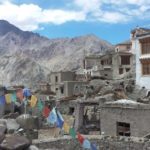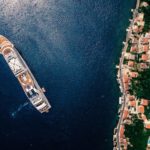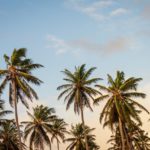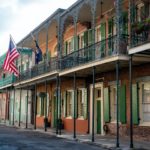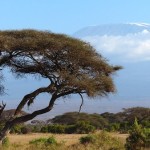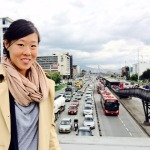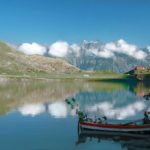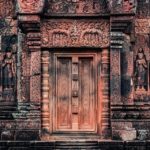Putting Guyana’s Intrigue on Paper: A Conversation with Author Jessica Eise
Jessica Eise’s book, Black River Redemption is a gripping read about an American scientist’s trials in Guyana. Through her writing Jessica shows that having a sense of perspective is always important, and that sometimes, considering others makes the hardest decisions feel clearer. I had the opportunity to ask Jessica some questions about her travels and experiences whilst on the road.
What initially brought you to Guyana? How long were you traveling through the country?
I was sent to Guyana for work and I can remember the moment they assigned me to the country vividly. I was sitting in Barcelona at my agency’s annual meeting and they posted our next assignments on a projector. I felt a thrill of excitement because, despite my many international travels, I knew nothing about the country. As strange as that sounds, the less I knew about a place the more exciting it was to be assigned to work there.
I had finally made it to the point where I could fully embrace who I was, and I could write without fear of judgment.
I suspect it taps into my childhood desire to be an explorer. At around age 6 or 7, the sense of dismay I experienced upon discovering that the entire world was already mapped was pretty extreme. Therefore, as an adult, going to the oddest of places was always the most satisfying. I spent three months total in Guyana and I was headquartered in the capital, Georgetown. From there I took excursions out into the country.
It’s incredibly courageous to travel alone to Guyana. What advice would you give to someone planning a solo trip to South America?
I spent part of the time in Guyana with my Venezuelan colleague, and part of the time alone. I have three pieces of advice for those traveling solo. First, don’t impair your judgment. Drugs and alcohol impair your judgment. Good judgment and trusting your intuition are your two best defenses against any danger. When you mess with those, you’re tossing aside your two key assets for staying safe.
Second, get to know people. The best thing about travelling alone is that you are absolutely, totally free to befriend those around you. You aren’t beholden to anyone.
Third, make an effort to learn about the history and the culture of the country you’re visiting. Each South American country is unique, and respect that by taking the time to understand something about the country’s past. It will give you an experience far deeper and more meaningful.
What would you say are some of the must-see tourist spots in Guyana?
Every uncomfortable second of travel (you must take a tiny plane to reach this site) is worth it five times over to see the magnificent and awe-inspiring natural wonders to be found in Kaieteur National Park. Upon arriving, we were handed a water bottle and guided down jungle trails by an Amerindian tour guide and an Amerindian park ranger (both from an Amerindian village 38 miles away, by river). They were mines of information, pointing out the flora and the fauna, and answering with a good-natured tolerance every inane question that fell out of my mouth. No, the carnivorous red flowers would not digest my finger if I poked at it. Yes, the park ranger’s uncle was the chief of his village. No, the tiny golden frog would not kill me instantly if I touched it but yes it would knock me out if I licked it.
We rounded the bend eventually and found ourselves with the first sight of the falls. It was remarkable. Some 740 feet of cascading, tumbling water crashing down to the jungle floor below with the mist of the fall erupting up hundreds of feet. Kaieteur Falls, a name unknown to most of the world, is five times the height of Niagara Falls and is the longest single-drop waterfall in the world. The bark and plant matter that infuse the water leaves it a murky, brown color as if someone left their tea steeping for well beyond three to five minutes.
The view was magnificent, and as we journeyed along the path, we were able to stop and see it from four vantage points. The final point was directly above the falls, and we could approach the edge at our own risk and peek over as the powerful waters rushed over the brink and tumbled towards the jungle below, a mighty demonstration of gravity’s universal pull.
Can you recommend any lesser known gems?
The Essequibo River is so wide at the estuary that there are small islands actually in the river. Eddy Grant, Guyanese musical wonder and genius behind 1982’s “Electric Avenue,” constructed a house that consumes the entirety of one of these islands. This river receives the Potaro that feeds the mighty falls of Kaieteur, flows 1,010 kilometers through the Amazon and savannah and is one of the largest and widest rivers in South America. Its water is like milky coffee, a murky brown from the sediment that it collects along its journey to the Atlantic Ocean, nearly consuming the entirety of the horizon until you barely see a sliver of green beyond.
Rather than feel diminished by its might, I was comforted. This river observed the evolution of man, nurtured the Amerindian tribes with its waters, witnessed the arrival of European colonizers, carried wretched slaving ships, shuffled the European colonizers back home, trucks Guyanese passengers across its surface back and forth to family and friends and – for one brief moment – was holding my frail human body on its surface.
The Essequibo has all the trappings of an ungainly, unsightly river. There are no crystal clear waters we find so beautiful. There are no wide, expansive white beaches along its shore. The waters are café au lait, the beaches small and uncommon, and the water gets choppy in the afternoons. But it is beautiful. It is beautiful for its uniqueness, power, history and might. It meets the Atlantic steadily, every day, every minute, feeding into the ocean across its 20-mile estuary. It’s not a flashy beauty, but by God, it is something to behold.
You’ve traveled extensively. What was it about your time in Guyana that inspired you to write Black River Redemption?
A combination of two things sparked my book on Guyana. The first was my own personal development. I had finally made it to the point where I could fully embrace who I was, and I could write without fear of judgment. Writing takes practice. It’s easy to be afraid when you’re pouring yourself into your passion, because you become so vulnerable. We live in a time when it’s almost en vogue to ‘not care.’ That simply isn’t me. I live passionately, and I pour myself into what I believe in.
Guyana itself was the second element of inspiration. Not only is the country endlessly fascinating, frustrating and beautiful, but I was plunged into a world of curious and unique characters who inspired so much of the novel. Military personnel, diplomats, Guyanese politicians, Amerindians… all of these characters conglomerated together spurred my imagination to new heights. I wanted people to see, experience and live what I was able to. I wanted to find some exciting way to share even just a little about this curious country of Guyana.
Where are you planning to travel to next?
Strangely, my next destination could be either Colombia or Mali. One of our faculty members in my department is doing some interesting research in Mali and it’s possible I will be needed on the ground to help cover some of the work he’s doing. The timeline on that is a bit unsteady, so it’s possible an exchange trip with some students to Colombia might be next. I speak Spanish fluently, so Colombia won’t be a problem – but my French is quite rusty and I’m a bit worried about Mali!
Now that you’ve settled into teaching now, how did you find the shift from constant travel to a more home-based life? Do you have any tips for someone who’s reaching a similar point in her life?
At a certain point in many wanderer’s lives, although not all, moving constantly begins to take a toll. There is a certain loneliness that accompanies constant moving, and there is a definite level of discomfort you experience. At about the time I was starting to get a bit tired of it, a wonderful professional opportunity cropped up Stateside. I’m able to adore and appreciate where I am now so much more than I would have ever been able to, because I can juxtapose it to some of the much harder places I’ve had to live.
Tips to others? First and foremost, work hard to ride through the urge to move on when you encounter hiccups or uncomfortable moments in your new home. When you move around a lot, you can just leave all the challenges behind and go to your next place. When you settle down a little, you have to confront those face on. Secondly, take advantage of the time you free up because you aren’t constantly traveling to develop some of your passions that had to take the sidelines. Finally, get involved in the community. This is essential. You need to become a part of where you are. Bring your big, broad mind to wherever you choose to live and share it with those around you.
Do you feel that your travels have changed you? How do you incorporate this in your teaching?
Traveling has done far more than change me, it has defined elements of my character. There is nothing I am more grateful for than those experiences. It’s quite common for people to simply say that ‘traveling broadens your mind,’ but I’m going to dig into that a little more.
Bring your big, broad mind to wherever you choose to live and share it with those around you.
When I read about things in the news, I can imagine either the place or person from that place in my mind. I spent quite some time in Cairo, Egypt, before the revolution. Whenever they showed Tahrir Square on the news, I could transport myself back there. I remembered getting out of the taxi with my sister and walking into the university, having a coffee at a café around the corner, and darting between the traffic to visit the museum. I can hear the voices, see the people, and smell the air. Everything is so much more personal. I thought of the stress my Egyptian acquaintances were feeling – the hopefulness, the worry, the confusion. The revolution wasn’t something happening a world away, but happening to people and places I knew.
I strongly encourage my students to read. Not everyone can travel, or wants to travel, the way that I did. This is actually one of the reasons I’m driven to write books. Through reading, we can put ourselves into other people’s shoes and broaden our minds. I also like to tell them stories from my travels. They really enjoy hearing about some of the bizarre things I’ve seen or done.
How can readers connect with you to talk about your travels or your books?
Follow me on Twitter @JessicaEise or connect with me on LinkedIn. I’m always very happy to talk about my travels and books.

